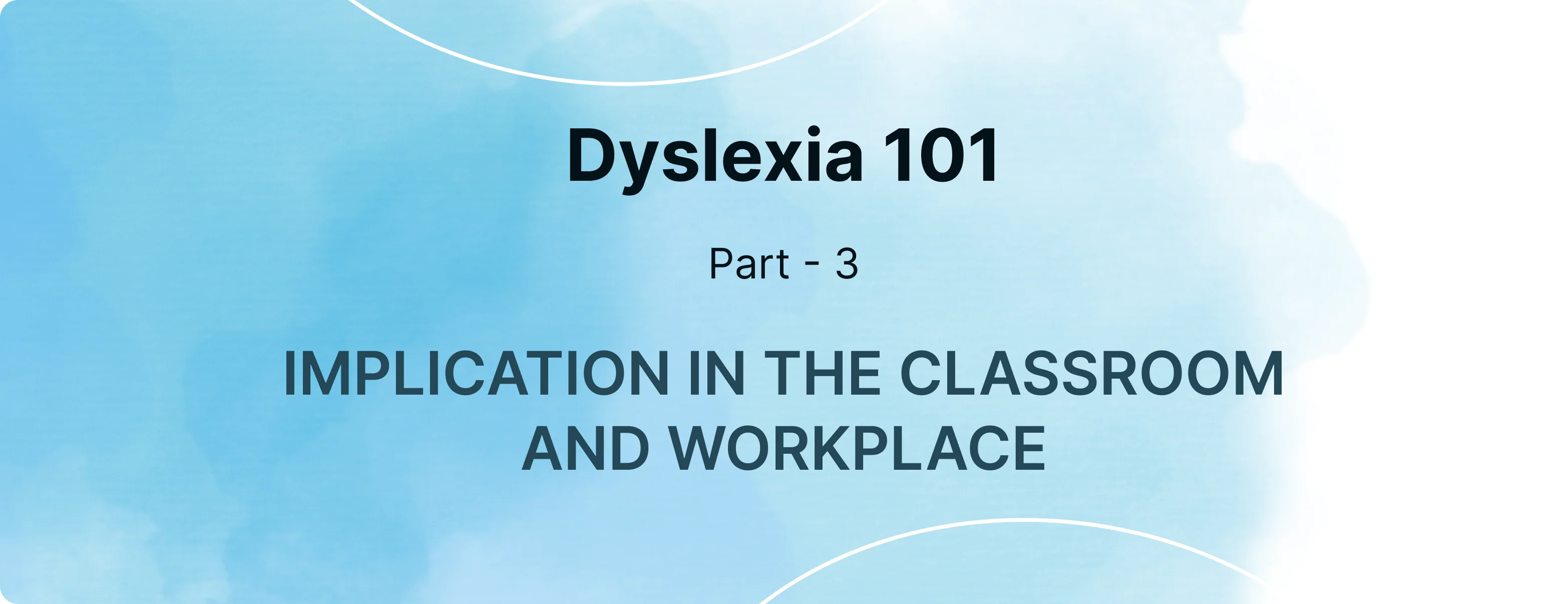Welcome to Part III of our Dyslexia 101 series. Over the next few weeks, our blog series will continue to focus on expanding your understanding of dyslexia.
By the end of LD Expert's Dyslexia 101 series you will be able to:
- Define dyslexia in a way that friends, family, and teachers can understand.
- Understand common characteristics of dyslexia.
- Understand how the common characteristics may impact students in the classroom and adults in the workplace.
- Recognize common misconceptions and learn the facts that dispel them.
- Understand what quality intervention looks like and describe why it is important that children have access to and receive early, evidence-based intervention services.
- Advocate for your child at school or for yourself in the workplace.
Today we will focus on the implications dyslexia may have in the classroom and workplace.
It's important to note that dyslexia is not the only language-based learning difference. These implications can apply to any student or adult that has a language-based learning difference.
In Part I of this blog series, we broke down the definition of dyslexia for you. In Part II, we examined the characteristics of dyslexia by outlining common struggles and strengths.
If you missed our earlier posts, here are Parts I and Part II.
Part III of our Dyslexia 101 series will focus on the implications, or the effects, you may see as a result of the struggles and strengths associated with dyslexia.

Implications of Dyslexia in the Classroom
Some of the things you may see in students with dyslexia as a teacher or parent...
- Difficulty with executive functioning skills such as organization, concentration, or following
multi-step directions
- Students' folders and binders may be a mess with papers sticking out everywhere, with
backpacks filled with never-turned-in-homework, or they may do the first part of an
assignment but not finish it.
- Reversal of letters such a "b", "d", "p", and "q" and numbers such as "7", "4", "5", and "9"
- Many teachers are told this is normal, but it is not developmentally normal after the age of
6.
- Reading the first and last part of a word before making up the middle to turn it into a familiar
vocabulary word (e.g. a student will read "imperfect" as "infect")
- Experiencing extreme anxiety related to reading aloud in front of peers
- Generally avoiding reading and phonics based activities
- Performing poorly on tests, especially when they are multiple choice tests, resulting in scores that
do not reflect their classroom participation or what they actually have learned
- Taking longer to copy from the board
- Students may frequently need to look back and forth from the board to their paper and they
may only copy a couple letters or numbers at a time
- Because of students' potential anxiety and difficulty with executive functioning skills, combined
with their learning difference(s), you may see behavioral issues. This can look like avoidance,
arriving unprepared or without materials, missing assignments, or a disrespectful attitude towards
school activities.
- Remember, this could be ALL be related to reading struggles! Kids don't want to be
the "bad" or challenging kid!
- An affinity for math or classes that allow for creative or non-writing related forms of expression
- A tendency to prefer to express themselves verbally with an increased ability to demonstrate their
understanding of material when allowed to discuss it aloud
Build time into your day to organize materials.
- Build time into your day to organize materials.
- Begin the day with 5-minutes of assisting students while they go through their assignment
books from the previous day.
- Make sure that students have all of the homework and materials they need for the
day.
- End the day with another 5-minute window where you assist students by going through their
assignment books.
- Help make sure that they have everything they need for homework.
- Make reading aloud optional, or assign specific passages to students to practice
before having to read them aloud
-
If you have a student that jokes, misbehaves, or actively avoids reading aloud, this may be
related to a reading difficulty.
-
Use a multi-sensory, explicit, and sequential approach to phonics for whole class instruction
- Prepare guided or skeleton notes that require students to fill-in one word here and there to
minimize copying from the board
- Make plans to offer assistive technology such as text-to-speech for independent work activities
- Do not wait to refer students to your school Special Education department for
evaluations.
- Early intervention makes ALL the difference! Trust your gut and trust your
mama bears when they tell you they're concerned about their student!

Implications of Dyslexia in the Workplace
Some things you may experience as an employee or notice as an employer...
- Disorganized desk or work materials
- Difficulty managing a schedule and/or keeping track of multiple appointments or projects
- The need for more time to read through memos, emails and training materials as well as the need for
additional time when completing projects
- Difficulty studying and organizing materials for required trainings, projects or assessments
- Trouble taking notes quickly during meetings which can make it difficult to focus on the meeting
material as the conversation moves forward
- Increased creativity with projects that require future or artistic vision
- The ability to see the big picture related to projects
- Sophisticated spoken vocabulary
- Emails may not match/reflect this same vocabulary or emails may be avoided with a preference
to talk by phone or in person
- The ability to be exceptionally empathetic
Some accommodations that can help adults in the workplace
are...
- Integration of assistive technology into the work day, such as calendar reminders and speech-to-text
& text-to-speech apps
- Explicit deadlines that allow time for another person to proof read for spelling errors
- Provide a study-buddy or an additional document that outlines the most important concepts on which
to focus for projects or assessments
- Provide daily, weekly, or monthly graphic organizers that help to organize and prioritize tasks
- Completing this with a supervisor can even build relationships!
- Delegate the task of taking meeting notes to one person and share the notes after the meeting with
the team
It is important to note that people with dyslexia often choose
career in a field of great interest to them. This allows them to be motivated and perform at high levels
because of their ability to persevere and channel their creativity. A large number of the most
successful entrepreneurs have dyslexia, and they view their learning difference as their super power
that helped drive their success!
We cannot overstate how much we love Drs. Shaywitz book, Overcoming Dyslexia. It is the Gold Standard
when it comes to books to help you understand and navigate life with dyslexia that is based on years of
research. Here's the link again to purchase!
Share This with Your Network and Friends
Looking for personalized support for your child's learning journey?
Our tutoring and dyslexia intervention services are tailored to students with learning differences. Whether it's reading, writing, or other challenges, our team offers one-on-one guidance.
Start with a consultation!





